
Once, already at the end of the USSR, I read a listing of some places of the famous cookbook of 1861 by Mrs. E. I. Molokhovets: “A present for young housewives, or a Means for reducing expenses in the household”. Recipes in the style of: “To clean the most beautiful smoked head of the old boar, cook it like a smoked ham ...” or “If you have guests and you have nothing, send a person to the cellar, let him bring a pound of butter, two pounds of ham, a dozen eggs, a pound of caviar, red or black and make a light dinner according to the following recipe ... ”read hilariously funny. People who did not compel the USSR, probably, no longer understand what I laughed at that time.
The late USSR was an amazing, largely funny and paradoxical society of total deficit. The price imbalance artificially created by the authorities led to the fact that many goods sold at lower prices than the market almost never reached the counter, being distributed among “their own people” and immediately switching to the black market.
But the purpose of this article is not to expose the vices of the USSR. I want to talk about the personal experience of a little boy who lived in a country with an unpredictable history and an uncertain future. The boy who loved reading books more than anything else.
I started reading late - in the first grade of the school. And I am still skeptical of the stories of familiar book readers that they managed to overcome several thick books by the age of five, including the unadapted Robinson. I think that these are more likely leprosy of memory than real memories - and some cases when grown up children enthusiastically telling about how they read the Hobbit at the age of five, published in Russian a year, when they turned ten, convince me of this.
My first book was “Twenty Thousand Leagues Under the Sea” by Jules Verne. Despite the fact that this book was published by the local Perm publishing house, it was impossible to buy it in the store. In the city library of the palace. Lenin was not there either — since books were of high value, some readers simply appropriated them to themselves. The fine for the loss of the book was less than the price of the book on the black market.
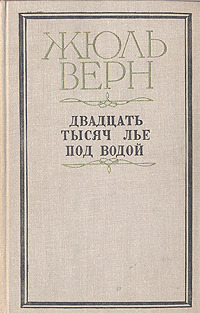
And it was on the black market in search of Captain Nemo that my mother went. Book collapses were forbidden, so books were sold from under the floor. Exactly like radio parts in “Ivan Vasilievich Changes the Profession”. Old Jules was worth 10 rubles - not a small sum at that time. But he was worth it.
Painfully, according to the syllables, while reading the first chapters, I was so passionate about the flow of the author’s imagination that I sincerely believed that this was a documentary story about recent events.
My next book was “Little Blue” - “The Mysterious Island” of the same author. I remembered the book not as a distorted recipe for nitroglycerin production, but as a completely fierce, unrealistic feint of the author - at the end of the book surfaced - you won’t guess for anything! CAPTAIN, his mother, NEMO !!! - from the first book I read!
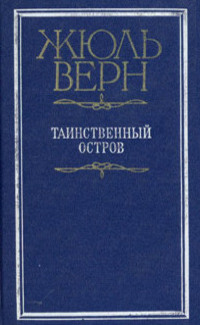
I apologize for the involuntary spoiler. I was so excited and inspired by this turn that I literally ran along the walls. Before that, I did not know that it was so possible - that the heroes from one book could stop by to visit another. Running to my mother, I choked on this epoch-making discovery.
Mom looked up from the easel, ruffled my hair and said: “So you just now learned that this is a trilogy? There is also a third novel, “Children of Captain Grant,” and it is associated with the first two. ”
Having learned about this, I began to sort through the events of the novels, trying to guess what the third story would be about. Of course, I remembered Ayrton, a muddy type saved by the colonists from a neighboring island. But the idea that he was a character in the third novel seemed completely ridiculous to me. Well, as if the Hobbit author, deciding to continue the story, would not send Bilbo on a new journey, but start ... well, I don’t even know what - he will write down in three volumes the story of the ring he found in the dungeon, for example.
The problem was that the "Children of the Captain" was not to get it. There was no book in the library. And it wasn’t on the black market - the Perm Book Publishing House, only wishing for my death, did not start publishing this novel by publishing some kind of “Fifteen-year-old Captain,” which was already shown on television and in which, from fiction, there was only an alcoholic who burned down alive .
Even my repeated visits to the library did not solve the problem - having decided that the person who took the book home would return it sooner or later, I started going to the library almost every day. The curious librarian found the charter of shaking hands in the book fund “Club of Famous Captains” by Clementius Mintz and Vladimir Kreps.
“Honor,” she said, “all the famous captains participate in the book. I suppose there is a captain Grant. Or himself, or his children. "
It was hard to come up with the worst solution.
The fact is that this book - smart, talented, subtle - told the story of the Club of Famous Captains. The mysterious organization, which consists of the heroes of popular adventure books: Captain Nemo, Captain Gulliver, Captain Munchausen (Baron), Captain Hatteras, Captain Tartaren (from Tarascon), Captain Arthur Gray and others, other, other ... There was even this insufferable fifteen year old upstart Dick Sand - since he was also a captain.

In the rustle of a mouse,
In the creak of floorboards
Slowly and decorously
We are leaving the pages ...
Meet the welcome hour
Hidden at twilight ...
We are all captains
Everyone is famous ...
After singing a song, the captains began an investigation of some mysterious incident. With a lot of adventures that led them to pages described in books of interesting places. Or they came across interesting people - who were also described in books.
The problem was that these books were not available. They simply weren't there. Neither for sale nor in the library. Famous captains were known during the book abundance of the 50s and 60s, and by the 80s, all these books were in private libraries or were worn to dust.
Looking ahead, I’ll say that I completed this quest as an adult - the last book mentioned in the Club, Five Hundred Million Begums with the first Doctor Evil in world literature, I managed to find already serving in the army.
But back to our captains. The next meeting with them, alas, was disappointing. Passing by the bookstore "Bukinist", I saw the book "The Extraordinary Adventures of Tartaren from Tarascon." Yeah, I said. I know you. And hurried to the store.
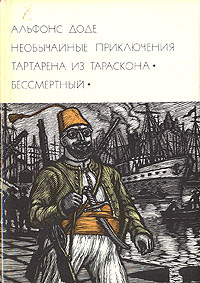
Where, in Aesopian language, met with the Oblomingo bird. Tartaren cost FIFTEEN rubles. That is, the ruble and twenty kopecks given to me for school breakfasts were not enough. The similar price was explained by the fact that the store was second-hand. In fact - a book flea market. A loophole with which bookstore employees could legally and officially speculate with books, saving money for the upcoming privatization.
My grandmother helped me with Tartaren. Despite the fact that the amount of 15 rubles was a quarter of her pension, she found this money by buying me a coveted book. And then a second bummer was waiting for me - there was no book. Tartaren was not a captain. It was a plump boastful boob, who did not, by all accounts, do anything heroic. Mints and Kreps monstrously flattered the puff, inviting him to his book, I was forced to state.
The book went on the shelf, and Tartaren for a long time took an honorable second place among my most unloved book characters. (The first place was occupied by Dick Send, if you forgot).
After a series of inarticulate complaints about Tartaren that I dumped to the librarian, I received an answer - of course, I was to blame for everything myself. I need to read books that fit my age.
“I tried it already,” I whined and whimpered. “These meaningless and poorly written stories are given to us at school.” There is only a description of nature and other utter horror.
“The books from the school curriculum were included in it with intent,” the librarian said, raising her finger up, “in order to prepare you for hardships and hardships in advance.” And you try this one:
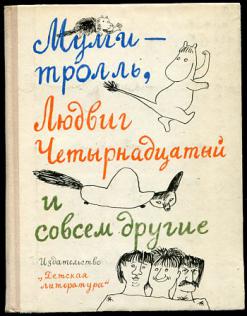
And she handed me the book “The Moomin Troll, Ludwig the Fourteenth and Quite Other”, in which there were three tales of Scandinavian writers. This book, read to the holes, survived, because it was not given out to anyone in the library.
Of course, I was fascinated. I took this book again and again in the library, reading and re-reading fairy tales. So far, without a little, has not memorized. The book entertained, taught, scared and asked questions. What is friendship? What is love? Can sentient beings overcome the roles imposed on them by nature and society? And what exactly did the muskrat's false teeth in a wizard's hat turn into?
Taking this opportunity, I hasten to share the answer to the last question - which I managed to find after forty years of tireless searches: III (drum roll)
These are hattifnata!
Do you remember? The hat changes the individual properties of objects that fall into it to the opposite. A poisonous hedgehog emerged from a venomous one, a hedgehog from a formidable sea lion, and a jungle from a labial Hemul ... Further, what do we know about hattifnata? Remotely, in color and shape, they resemble teeth. Active travelers as opposed to Muskrat. And since the hat has already been seen reviving inanimate objects (Remember the scattered words from the foreign dictionary?), The version with revived teeth seems to me the only true one. Do not believe? Hatifnattas in Swedish Hattifnattar. Hatt is a hat. Natta is the night. Hatifnattas - sleeping in a hat. Everything secret has become apparent!
- Yes, - I was forced to admit, returning the book - children's books can also be interesting.
“Here,” said the librarian, “but you did not believe.”

And she gave me the next book - “The Wizard of the Emerald City” with the incomparable illustrations of Leonid Vladimirsky. Her and the following books, I read excitedly. And re-read it several times, marveling at the author’s fantasies. While reading, I noticed some subtle subtlety - the first book in the series I liked much less than others. She was different - and only as an adult did I find out why. Thus, without knowing it, I read the first fan fiction and received documentary evidence that the fan fiction of a talented author could be better than the original.
And for the first time faced with Soviet censorship. The last book of the series, “The Mystery of the Abandoned Castle”, for some reason inexplicable for little me, was published in the tiny Kazakh newspaper “Friendly Guys”. In separate issues that came out over four years.
That was a setup!
I still managed to read the book - the newspaper was found in the reading room of the city library named after Lenin. Mom went there to make extracts on work and they let me in with her, taking from me a promise not to make noise. But, before I could read the book, the Soviet government lifted the unspoken ban by printing this novel after a decade of oblivion in one of the central publishing houses.
Having got a new book, I reread it ... and was horrified. The text of the novel was completely different. Smooth, simplified, childish. Even the traditionally magnificent illustrations of Vladimirsky did not save the situation.
Now I know that in the USSR of those years there was a complex system of preparing books for printing. By design, this complex system of rules was to protect the Soviet reader from the horrors of capitalist reality. In reality, it served to fool, simplifying and castrating literature.
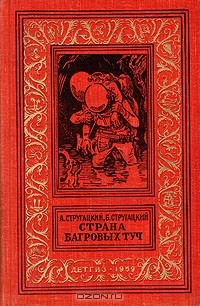
So, for example, the famous scene from "The Country of the Crimson Clouds" by Arkady and Boris Natanovich, was significantly cut down by censorship:
I quote from the 1959 edition.
- I do not care about everything! .. I do not care about the Golconda! This is mean, comrade Ermakov! I will not leave! To hell! I am left alone ...
Bykov saw Ermakov’s face turn gray. The planetary commander did not move, but friendly notes disappeared in his voice: - Comrade Yurkovsky, stop the tantrum, put yourself in order!
I order you to put on a helmet and get ready for the campaign!
... actually had a sequel in which the characters showed themselves from an unexpected angle:
- So? Yes? So? He shouted. “Let it be!” To hell! I am left alone!
Bykov grabbed his shoulder.
- Where? Without a helmet, Satan! ..
Yurkovsky hit him with a butt in the face, dark drops splashed on the silicone cloth of the suit. Bulls, leaning, tore his weapon from his hands, breaking fingers. Both collapsed to the floor. Yurkovsky resisted frantically. Before Bykov's eyes, grinning teeth gleamed, a suffocating whisper wheezed in his ears:
- Bastard! .. Let it go, bastard! .. Brick face ... Gendarme, you bastard! ..
I will not make assumptions about what the country will end up with, whose people for several generations have convinced that the only struggle is the struggle of the good with the best. You know without me how it all ended.
I can only note that this censorship suddenly came to me when I began to write books - many readers reproach me in letters that the astronauts described in my book cursed and staged an ugly fight in the finale. “In Soviet books,” they write to me, “the astronauts didn’t allow themselves that!”
Allowed, my dears! It’s just that you weren’t informed about this.
But, back in 1982. After I gave the chance to children's books, the reading situation improved a bit. I read The Hobbit, Pinocchio, Dunno and all the tales of Gianni Rodari. The last one, I re-read it to my son not so long ago and I can’t help myself, so as not to quote the fragment - before that it sounds modern and relevant today.
"Jelsomino in the Land of Liars" by Gianni Rodari
So, long before Gelsomino came to this country, there appeared a cunning and cruel pirate nicknamed Giacomone, which means Big Giacomo. He was so huge and fat that he bore his heavy name without any difficulty. But he was already young and therefore began to think about how to spend his old age more calmly.
“My youth has passed, and I'm already tired of surfing the seas,” he decided. - I'll give up my old craft and settle on some island. And, of course, not alone, but with his pirates. I’ll make them into the majordoms, I will make them lackeys, grooms and managers, and they will not be offended by my chieftain. ”
No sooner said than done. And the pirate began to look for a suitable island. But they were all too small for him. And if the island suited Giacomone himself, then some of his gang did not like it. One pirate certainly needed a fast river to catch trout in it, another wanted a movie theater on the island, and the third could not do without a bank where he could get interest from pirate savings.
“And why don't we look for something better than the island?” - said the pirates.
The thing ended in the fact that they captured an entire country with a big city, in which there were banks, and cinemas, and a dozen rivers, where you could fish trout and ride a boat on Sundays. And this is not surprising - every now and then it happens that some pirate gang captures this or that small country.
Having seized the state, Giacomone decided to call himself King Giacomone the First, and he conferred the titles of admirals, chamberlains and chiefs of fire brigades with his entourage.
Of course, Giacomone immediately issued an order that ordered him to call himself “Your Majesty”, and cut off the tongue for anyone who disobeys. And so that it would not occur to anyone to tell the truth about him, he ordered his ministers to compile a new dictionary.
- You need to swap all the words! He explained. - For example, the word "pirate" will mean "honest man." If someone calls me a pirate, he will simply say in a new language that I am an honest fellow!
“My youth has passed, and I'm already tired of surfing the seas,” he decided. - I'll give up my old craft and settle on some island. And, of course, not alone, but with his pirates. I’ll make them into the majordoms, I will make them lackeys, grooms and managers, and they will not be offended by my chieftain. ”
No sooner said than done. And the pirate began to look for a suitable island. But they were all too small for him. And if the island suited Giacomone himself, then some of his gang did not like it. One pirate certainly needed a fast river to catch trout in it, another wanted a movie theater on the island, and the third could not do without a bank where he could get interest from pirate savings.
“And why don't we look for something better than the island?” - said the pirates.
The thing ended in the fact that they captured an entire country with a big city, in which there were banks, and cinemas, and a dozen rivers, where you could fish trout and ride a boat on Sundays. And this is not surprising - every now and then it happens that some pirate gang captures this or that small country.
Having seized the state, Giacomone decided to call himself King Giacomone the First, and he conferred the titles of admirals, chamberlains and chiefs of fire brigades with his entourage.
Of course, Giacomone immediately issued an order that ordered him to call himself “Your Majesty”, and cut off the tongue for anyone who disobeys. And so that it would not occur to anyone to tell the truth about him, he ordered his ministers to compile a new dictionary.
- You need to swap all the words! He explained. - For example, the word "pirate" will mean "honest man." If someone calls me a pirate, he will simply say in a new language that I am an honest fellow!
Even the children of Captain Grant hiding from me were caught! My relatives from Moscow, where books were sometimes sometimes sold in stores, were bought and sent to me by mail. Reading them, I was surprised to find not only Ayrton, but also the lanky and awkward Paganel, already familiar to me from the stories of Mintz and Kreps.
“It turns out that to get into the club of captains - IT WOULD NOT NEED TO BE A CAPTAIN!” - I was indignant. It was ridiculous. It broke the whole orderly scheme!
The next blow dealt to me by the universe was stronger and bitter. I found out about the existence of a conspiracy of librarians. Yes, yes - these malicious ladies, having conspired, decided to protect me from "books that are not suitable for me by age" - having hidden from me several surviving volumes from the collection of works of Jules Verne of 1954.
My revenge was terrible for its symmetry.
I begged my mother to contact friends from System. And very soon he became the proud owner of two of the three * rarest Soviet books: “Angelica” by Ann and Serge Golon and “Bull Hour” by Ivan Efremov.
*
Topping the list of the rarest books “Masters and Margarita” - even they could not get it. It was the rarest book of the USSR - about which everyone spoke, but which of my friends no one had read.

And if the first was, by Hamburg's account, still good, interesting - but still a female novel, which was banned due to the intimate shaving scene of the main character, then the fate of the second is quite indicative. In this novel, the author carefully, with reservations, tried to bring up the crisis of the socialist system.
After that, the novel was declared non-existent - the copies remaining in the libraries ceased to be issued, and in the collected works of 1975 the novel was not remembered even in the afterword.
Therefore, seeing both of these rarities in the child’s hands, the librarians howled into their voices. And then they asked for books to read.
“Well ... I don’t even know ...” I said pointedly, “are you old enough to read these books ...”
After that, an agreement was concluded by both high (and one low) contracting parties. According to which I could even go to the holy of holies of the library - in the vault.
However, the victory won very soon turned into a defeat - life prepared me another trick. Reading one of the popular science articles by Pyotr Vasilievich Makovetsky, I came across a mention of a certain planet Saraksh. The article considered a mathematical model of strong refraction, because of which the surface of the planet seems to be concave to its inhabitants.
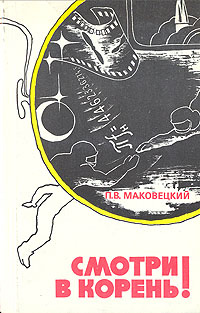
But I, as you understand, were not interested in this. And Saraksh himself - from the hints scattered throughout the article, it was obvious that this was an amazingly interesting place. Having tried to find this book, I found out about the existence of the “List of literature not recommended for distribution” - in which all space fiction of two decades turned out to be.
But, I’ll talk about this in the next article.
The scene after the credits
Once upon a time, when I was still a sergeant in the Red Army, I bought Larry Niven's book The World Ring. And ... Fuck! Bah! Wow! Ai-and-and-and! Doo doo doo doo doo All five of my senses were injured at the same time. The plot began right off the bat - a puppeteer appears on the second page, on the third kzin, on the fifth they fly for an alien artifact ... The author boldly manipulated entities unknown to the reader, without explaining anything. Further, faster, forward!
The reader, accustomed to the classic development of the plot, was unusual to read, but interesting. Then, however, I found out that foreign readers look at this novel in a slightly different way: for them, Mir-Ring is another story in the Famous Cosmos series, all the secrets of which have been explained long ago in previous works. I also read them, but later. With pleasure, but without enthusiasm.
Therefore, I consider my reading order of this series ideal. So much so that I decided to try to consciously repeat it, presenting the fourth work from the cycle “I am an Engineer at Mom” for trial. Postmodernists can do that for us.
Threat. The story was written after discussions on Habré, in which there were complaints that little is written about science fiction today. And in the one that they write explosions in space, they bum and asteroids are teeming with dumplings in soup.
Well, I decided to write a story - where there is all of the above. And implants. And fights in space on fighters. And a beautiful alien. And let the one who says that this is not a solid NF be the first to throw astone at me ! snowball!
I-Tetramino Notes
The reader, accustomed to the classic development of the plot, was unusual to read, but interesting. Then, however, I found out that foreign readers look at this novel in a slightly different way: for them, Mir-Ring is another story in the Famous Cosmos series, all the secrets of which have been explained long ago in previous works. I also read them, but later. With pleasure, but without enthusiasm.
Therefore, I consider my reading order of this series ideal. So much so that I decided to try to consciously repeat it, presenting the fourth work from the cycle “I am an Engineer at Mom” for trial. Postmodernists can do that for us.
Threat. The story was written after discussions on Habré, in which there were complaints that little is written about science fiction today. And in the one that they write explosions in space, they bum and asteroids are teeming with dumplings in soup.
Well, I decided to write a story - where there is all of the above. And implants. And fights in space on fighters. And a beautiful alien. And let the one who says that this is not a solid NF be the first to throw a
I-Tetramino Notes